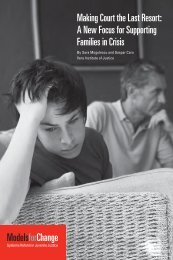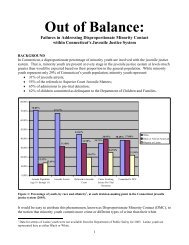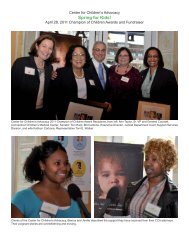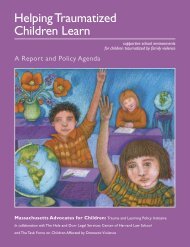2010 Annual Report.indd - Center for Children's Advocacy
2010 Annual Report.indd - Center for Children's Advocacy
2010 Annual Report.indd - Center for Children's Advocacy
You also want an ePaper? Increase the reach of your titles
YUMPU automatically turns print PDFs into web optimized ePapers that Google loves.
Our legal intervention has made a difference <strong>for</strong> the most vulnerable children . . .<br />
One morning, when Ephraim was eight years old, his mother put on her coat, lifted a bag fi lled with laundry,<br />
and told Ephraim to stay in the apartment ... she’d be back in a few minutes. When she didn’t return in half<br />
an hour, Ephraim was worried. When an hour had passed, he was scared. By afternoon, he was crying as he<br />
knocked on neighbors’ doors to see if anyone knew where his mother had gone.<br />
A concerned neighbor took Ephraim inside. Together, they wrote a note and left it on Ephraim’s apartment door<br />
so his mother would know where to fi nd him. By eight o’clock that night, without any word from Ephraim’s mother,<br />
the neighbor called police to report that she was missing. The police called the Department of Children and<br />
Families (DCF).<br />
Ephraim was placed in a SAFE home – a group shelter – while DCF looked <strong>for</strong> an appropriate foster home to<br />
care <strong>for</strong> him. Ephraim, who has signifi cant mental health needs, was not an easy child to care <strong>for</strong>. At age nine, he<br />
was placed in a therapeutic foster home, and over the next fi ve years Ephraim lived in a series of seven different<br />
foster placements. At age 14, DCF brought Ephraim to a hospital <strong>for</strong> psychiatric evaluation.<br />
Ephraim lived in institutions <strong>for</strong> most of his teenage years. On his eighteenth birthday, Ephraim had “aged out”<br />
of DCF care. He was discharged to the community and struggled in a transitional placement. He was <strong>for</strong>ced to<br />
move twice in the next few months, each time struggling to con<strong>for</strong>m to the expectations of community life. Finally,<br />
when yet another transitional placement could not handle Ephraim’s complex mental health needs, he was taken<br />
to a psychiatric hospital to be evaluated <strong>for</strong> admission. When he did not meet the criteria <strong>for</strong> involuntary admission,<br />
Ephraim was dropped off at a city homeless shelter.<br />
The <strong>Center</strong> <strong>for</strong> Children’s <strong>Advocacy</strong> became involved with Ephraim with a call received from the homeless shelter.<br />
We intervened on Ephraim’s behalf and worked with DCF to fi nd an appropriate placement <strong>for</strong> him instead<br />
of the homeless shelter. Our legal advocacy encouraged DCF to help Ephraim enroll in a vocational education<br />
program in a therapeutic environment.<br />
With our legal help, Ephraim is making progress. He is working hard to earn his high school diploma, and is living<br />
in a DCF-supported apartment in the city. Ephraim’s CCA attorney is in touch with him often to be sure that he is<br />
safe and receiving the support services he needs.<br />
Ephraim’s challenges are not unusual. Individual cases in<strong>for</strong>m systemic advocacy and Ephraim’s involvement<br />
with DCF highlights two critical issues that we continue to address.<br />
Child development experts are virtually unanimous in their opinion that congregate care settings, such as SAFE<br />
homes, are not appropriate placements <strong>for</strong> very young children. We successfully advocated to have DCF withdraw<br />
proposed plans <strong>for</strong> a new SAFE home <strong>for</strong> young children, and achieved legislative backing <strong>for</strong> proposed<br />
law to prohibit these placements.<br />
There are many teens aging out of DCF care with no place to go and no skills to depend upon. We continue to<br />
advocate <strong>for</strong> legislative initiatives that encourage continued support <strong>for</strong> this vulnerable population, providing<br />
vocational education and community support services as youth learn to live on their own. The <strong>Center</strong>’s amicus<br />
brief submitted to Federal Court in the class action case of Juan F. stresses the necessity of continued federal<br />
oversight of DCF and the importance of careful attention as youth transition out of DCF care.
















